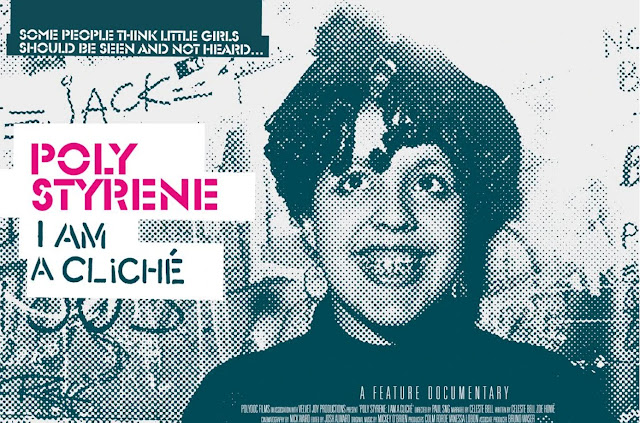As the legendary frontwoman for punk band X-ray Spex, lead singer Poly Styrene was known for her bold sense of fashion as well as being one of the most prominent people of colour within the punk scene. Leaving behind boxes of photos and newspaper clippings after her death in 2011, her daughter Celeste Bell uses this archive along with excerpts from Poly's diaries to try and understand more about her mother and their often fraught relationship, and the issues that caused her to kill off her band at the height of their success.
Written and co-directed by Celeste (alongside Paul Sng), I Am A Cliché follows Poly's journey from Brixton teenager to performing on Top of the Pops and at New York's iconic CBGB's, as she confronted cruel jibes about her appearance, racist mindsets and her own mental health issues that saw her admitted to a psychiatric ward. Born Marianne Elliott-Said in 1957 to a white British mother and black Somalian father, Poly placed an ad in Melody Maker to form X-Ray Spex after seeing Sex Pistols on her 19th birthday in 1976, adopting her "plastic, synthetic" pseudonym by looking through the Yellow Pages. This was also a time when the racist attitudes of the National Front were prevalent (as well as certain factions of the punk crowd), and the film looks at Poly's identity issues as a mixed race woman - using the lyrics for her songs Identity and Half Caste - along with taunts her about her curly hair, the braces on her teeth, and her unique fashion sense that involved brightly coloured plastic and vintage materials clashing together.
The film uses new audio interviews with performers influenced by Poly's work, such as Kathleen Hanna and Neneh Cherry, and admirers and contemporaries such as Vivienne Westwood, John Robb, Don Letts, Jonathan Ross (whose first ever gig was X-Ray Spex at The Roxy) and Sonic Youth's Thurston Moore (who saw them perform at CBGB's). Also included are some of her former bandmates, Lora Logic and Paul Dean, who talk about the band's musical journey and Poly's lyrics, and how they were unaware of the extent of the psychological problems she was facing at the time, downplaying the hallucinations she was having. These effects of these ongoing mental health problems - misdiagnosed as schizophrenic, she was eventually found to be bipolar - is something Celeste speaks about firsthand, waking up to find her mother stood at the foot of her bed.
With Celeste as our guide walking in her mother's footsteps, due to her resemblance to her mother it's almost like we're seeing a ghost re-enact scenes from a former life. The film's masterstroke is using actor Ruth Negga to narrate pages from Poly's diaries, allowing us to build a far deeper connection than would be possible through just the use of old clips and photos. At the core of this film is that connection between mother and daughter (Celeste states at the start of the film that "People often ask me if she was a good mum"), and the narration from both women feels like we are hearing from both sides. Whereas Celeste can now look back on her life with her mother and the embarrassment she felt at her DIY fashion sense when out shopping with her "what an ungrateful brat I was" , Poly can also talk about how she felt being criticised by audiences for her looks (with the record label slimming down her image on their album cover) and then suddenly called a sex symbol, a label she rebelled against by shaving all of her hair off in Johnny Rotten's bathroom.
There's a sombre tone to the film that makes it extremely moving as Celeste continues on her journey through her mother's life, from finding religion in the Hare Krishna movement to custody problems to efforts to reconcile before she passed with a shared love of music. It's an extraordinarily revealing documentary that paints Poly/Marianne as a troubled woman, not given the support she needed in an unforgiving music scene. It's a powerful film that could only be made by someone close to her, allowing Celeste to deal with a lot of her own trauma from her relationship with her mother, whilst also showing her to be the trailblazing punk icon she really was.
Verdict
4/5
Poly Styrene: I Am A Cliché is on general release from 5th March, and can be pre-ordered via the Modern Films website where you can help support your local independent cinema.






